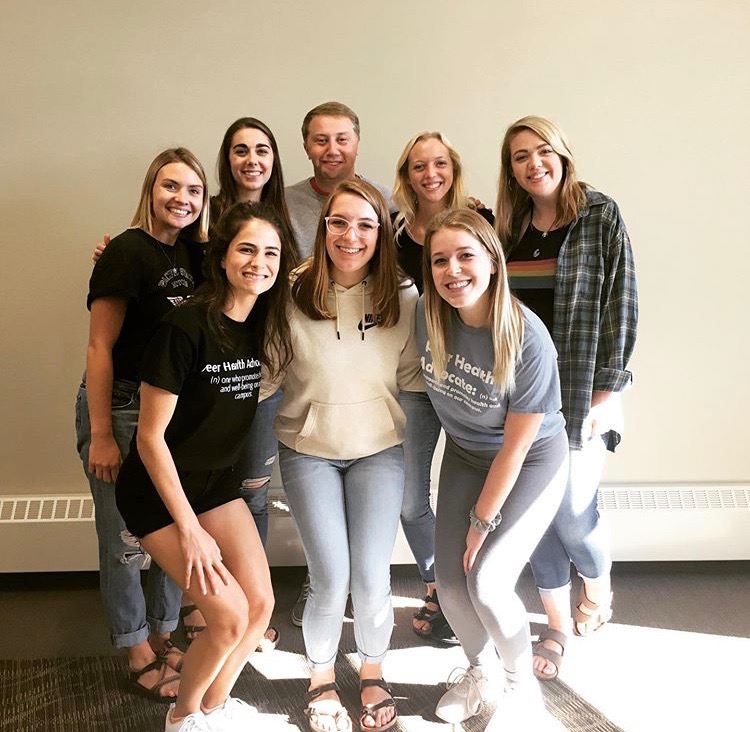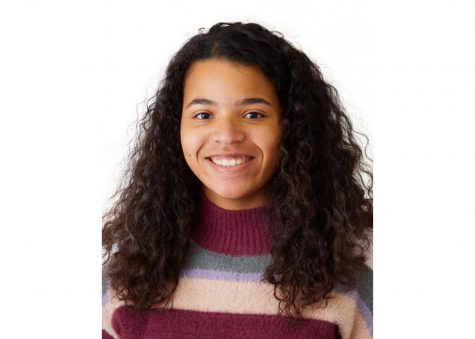Peer Health Advocates spread health awareness to UWL students
PHA’s, from left to right first row: Natalie Bachmeier, Emily Holden, Derek Krzykowski, Jenna Slack, Lorinda Volzer. From left to right second row: Claire Holzschuh, Lilli Minor, Abbey Robers. Not pictured Gabrielle Strittmater. Retrieved from Cassandra Worner.
November 25, 2019
Since 2014, Peer Health Advocates (PHAs) have been spreading health awareness to other young adults on the University of Wisconsin-La Crosse campus. This student-led position often uses games and educational materials to inform students on different aspects of their health.
PHA Abbey Robers said, “We go to different events on campus or to the residence halls and we teach our students about health and wellness. This includes things like safer drinking practices, sexual health, mental health and violence prevention.” For example, PHAs host an event called Consent and Pizza, where they eat pizza with students while starting a dialogue about consent and sex.
Wellness Coordinator Cassandra Worner who oversees the PHAs, said, “Mentoring and working with the Peer Health Advocates is my favorite part of my job. They have so much energy and they are aware of what the needs of our campus are. It’s great to work with them so we can do a direct student-to-student education model.”
Lilli Minor said that she wanted to become a PHA because of her passion for health and wellness. She said, “I was an RA my sophomore year and I used PHAs a lot for programming. As I narrowed down my major to Public Health and Community Education, I heard about this position and thought it would be perfect for what I want to do with my life.”
Worner said that PHAs are important because of the dynamic that they can bring to campus. Worner said, “PHAs can identify and connect with other students. They do a better job of providing that type of education.”
Minor said, “Teaching about health in a peer-to-peer way is really impactful. Our peers are likely more receptive to hear it from us. We aren’t doctors or educators. We just want to be alongside them to teach them healthy practices.”
Worner said that for incoming freshmen, college can be overwhelming. “Most high schools don’t comprehensively teach sexual health education. It is important to educate students on topics like these because we know when people have the skills and the knowledge, they’re able to make informed decisions that align well with their values,” said Worner.
Minor said that her favorite events are when they can destigmatize sexual health. “You can really tell when students are being impacted by our work when we are working in residence halls or when people come up to us when we are tabling and they actually engage in conversation with us,” said Minor.
For example, Robers said, “I had a circumstance where a student expressed to me that they weren’t interested in drinking during school. It was really impactful to me that they felt comfortable enough to come up to me to have a real conversation.”
As PHAs are a relatively new position at UWL, there is still room for them to grow in their health education. Worner would like to develop more events for PHAs that feature vaping education. “On campus, there is a smoke-free air policy, but currently e-cigarettes are not included in that. We want to make sure that this changes because we know the effects that second-hand smoke can have,” said Worner.
Worner feels that there are still advancements to be made for diversity on campus. “We want to improve our work with students with identities that don’t reflect our own. PHAs are a visibly white group and are almost all female-identified students. More diversity will more accurately reflect the student experience here at UWL,” said Worner.
Some PHA-sponsored events to look out for are Cupcakes and Condoms on Dec. 2 at the Student Union and Destress Fest on Dec. 12 at the Hall of Nations in Centennial Hall. This event will be promoting HIV/AIDS prevention and education, while Destress Fest gives students a chance to wind down before finals with snacks, massages, essential oils and other activities.
For students who are interested in applying to be a PHA, more information can be discovered at the information booths or at other events that PHAs host around campus. Robers said, “If someone is really interested in becoming a PHA, come to our events! You can always read a job description but seeing what we do in person can be really impactful.”
The PHA application is due in March but more information such as the job description and job requirements can be found on their website or their Facebook and Instagram pages.







